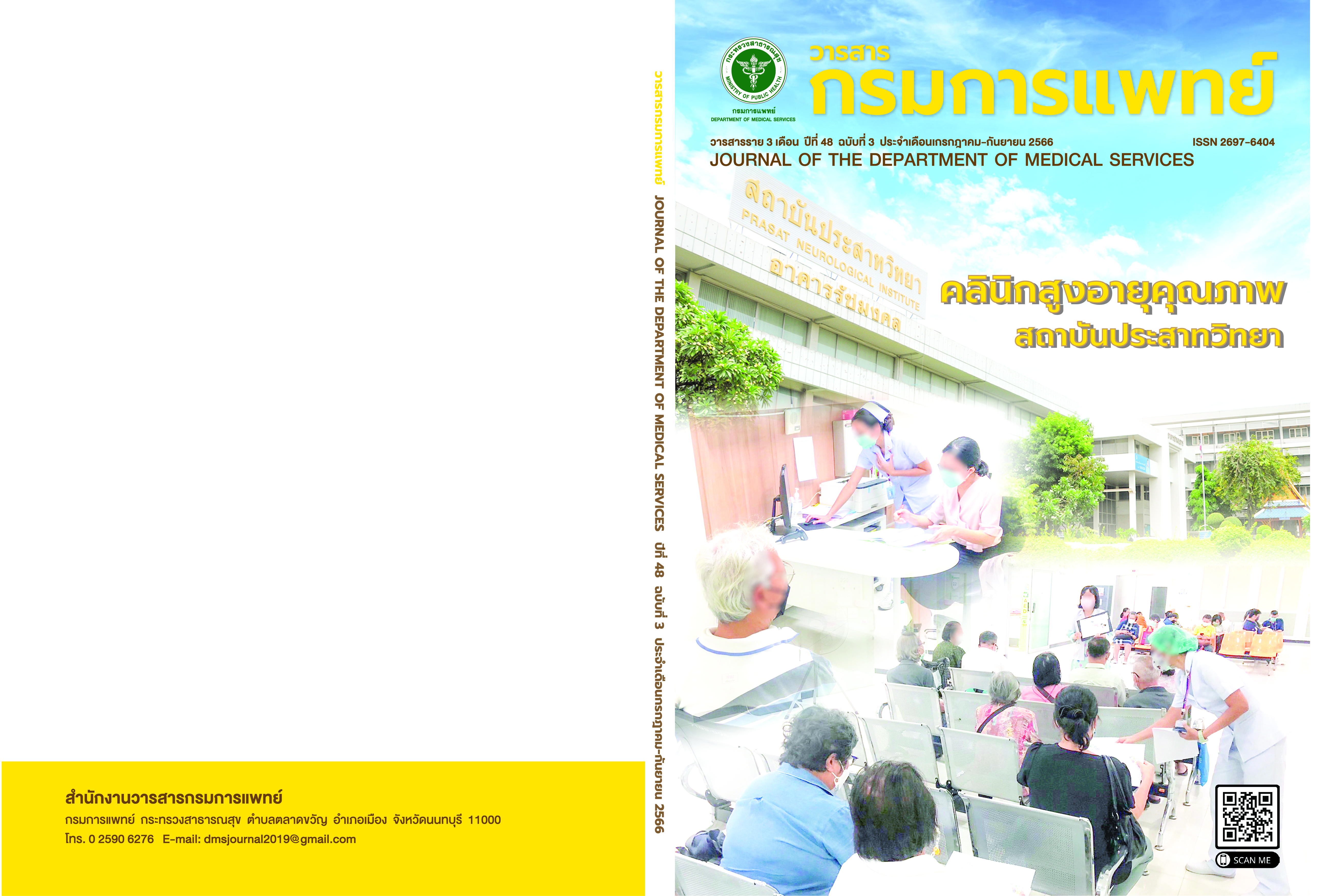Prevalence of Vitamin D deficiency in Pediatric Inflammatory Bowel Disease: A Retrospective Study at Queen Sirikit National Institute of Child Health
Keywords:
Pediatric inflammatory bowel disease, Pediatric Crohn’s disease, Pediatric Ulcerative colitis, Vitamin D deficiencyAbstract
Background: Vitamin D has a significant role in maintenance of GI barrier integrity, regulating gut mucosal immunity, impacting GI microbiota, and modulating anti-inflammatory immune responses. Therefore, vitamin D deficiency may be the cause of IBD or aggravated disease progression. Objective: The primary objective is to evaluate the prevalence of vitamin D deficiency in Pediatric Inflammatory Bowel Disease (PIBD) patients at QSNICH. The secondary objective is to find associated factors of vitamin D deficiency. Method: A retrospective descriptive study was conducted by using a case record form. Inclusion criteria were PIBD patients at QSNICH who had blood levels of a total of 25-hydroxyvitamin D (25(OH)D) during October 1st, 2018 – September 30th, 2020. Data were collected from outpatient medical records, which included demographic, clinical and laboratory data, disease activity, and treatment. Results: From a total of 33 cases of PIBD patients, 19 (57.58%) were diagnosed with Crohn’s disease (CD), and 14 cases (42.42%) were ulcerative colitis (UC). The median age and duration of disease were 133 months (range 13-205 months), 25 months (range 3-145 months), respectively. 30.3% of patients were male. 57.6% of the patients had Fitzpatrick skin type 4, 93.9% of the patients exercised less than 30 minutes/day, and 84.8% of the patients had sun exposure of less than 1 hour/day. The prevalence of Vitamin D deficiency in PIBD was 39.4%, which could be divided into subgroups of CD 47.4%, and UC 28.6% which was not statistically different (p-value = .497). Comparing the vitamin D deficiency group and the non-vitamin D deficiency group, including patients’ factors, diseases factor, drugs, and other factors, the significant correlation between both groups were Fitzpatrick skin type (p-value = .02) and received anti-TNF therapy (p-value = .028). Conclusion: Vitamin D deficiency was commonly seen in IBD patients. The risk factors for vitamin D deficiency in this group of patients were skin type and anti-TNF therapy.
References
Sýkora J, Pomahačová R, Kreslová M, Cvalínová D, Štych P, Schwarz J. Current global trends in the incidence of pediatric-onset inflammatory bowel disease. World J Gastroenterol 2018;24(25):2741-63.
Ng SC, Tang W, Ching JY, Wong M, Chow CM, Hui AJ, et al. Incidence and phenotype of inflammatory bowel disease based on results from the Asia-pacific Crohn’s and colitis epidemiology study. Gastroenterology 2013;145(1):158-65.e2.
Ardesia M, Ferlazzo G, Fries W. Vitamin D and inflammatory bowel disease. Biomed Res Int 2015;2015:470805.
Del Pinto R, Pietropaoli D, Chandar AK, Ferri C, Cominelli F. Association between inflammatory bowel disease and vitamin D deficiency: A systematic review and meta-analysis. Inflamm Bowel Dis 2015;21(11):2708-17.
Pappa HM, Langereis EJ, Grand RJ, Gordon CM. Prevalence and risk factors for hypovitaminosis D in young patients with inflammatory bowel disease. J Pediatr Gastroenterol Nutr 2011;53(4):361-4.
Levin AD, Wadhera V, Leach ST, Woodhead HJ, Lemberg DA, Mendoza-Cruz AC, et al. Vitamin D deficiency in children with inflammatory bowel disease. Dig Dis Sci 2011;56(3):830-6.
Levine A, Koletzko S, Turner D, Escher JC, Cucchiara S, de Ridder L, et al. ESPGHAN revised porto criteria for the diagnosis of inflammatory bowel disease in children and adolescents. J Pediatr Gastroenterol Nutr 2014;58(6):795-806.
Holick MF, Binkley NC, Bischoff-Ferrari HA, Gordon CM, Hanley DA, et al. Evaluation, treatment, and prevention of vitamin D deficiency: an Endocrine Society clinical practice guideline. J Clin Endocrinol Metab 2011;96(7):1911-30.
Mouli VP, Ananthakrishnan AN. Review article: vitamin D and inflammatory bowel diseases. Aliment Pharmacol Ther 2014;39(2):125-36.
Li XX, Liu Y, Luo J, Huang ZD, Zhang C, Fu Y. Vitamin D deficiency associated with Crohn’s disease and ulcerative colitis: a meta-analysis of 55 observational studies. J Transl Med 2019;17(1):323.
Veit LE, Maranda L, Fong J, Nwosu BU. The vitamin D status in inflammatory bowel disease. PLoS One 2014;9(7):e101583.
Chailurkit LO, Aekplakorn W, Ongphiphadhanakul B. Regional variation and determinants of vitamin D status in sunshineabundant Thailand. BMC Public Health 2011;11:853.
Senaprom S, Yamborisut U, Rojroongwasinkul N, Wimonpeerapattana W, Purttiponthanee S, Khouw I, et al. FACTORS ASSOCIATED WITH VITAMIN D STATUS AMONG THAI CHILDREN AGED 3-13 YEARS. Southeast Asian J Trop Med Public Health 2016;47(2):277-86.
Ham NS, Hwang SW, Oh EH, Kim J, Lee HS, Park SH, et al. Influence of severe vitamin D deficiency on the clinical course of inflammatory bowel disease. Dig Dis Sci 2021;66(2):587-96.
Haifer C, Lawrance IC, Center JR, Clarke MW, Hart PH, Eisman JA, et al. Vitamin D metabolites are lower with active Crohn’s disease and spontaneously recover with development of remission. Therap Adv Gastroenterol 2019;12:1756284819865144.
Branco JC, Cardoso MF, Anapaz V, Lourenço LC, Oliveira AM, Rodrigues CG, et al. Vitamin D deficiency in a portuguese cohort of patients with inflammatory bowel disease: prevalence and relation to disease activity. GE Port J Gastroenterol 2019;26(3):155-62.
Frigstad SO, Høivik M, Jahnsen J, Dahl SR, Cvancarova M, Grimstad T, et al. Vitamin D deficiency in inflammatory bowel disease: prevalence and predictors in a Norwegian outpatient population. Scand J Gastroenterol 2017;52(1):100-6.
Downloads
Published
How to Cite
Issue
Section
License
Copyright (c) 2023 Department of Medical Services, Ministry of Public Health

This work is licensed under a Creative Commons Attribution-NonCommercial-NoDerivatives 4.0 International License.
บทความที่ได้รับการตีพิมพ์เป็นลิขสิทธิ์ของกรมการแพทย์ กระทรวงสาธารณสุข
ข้อความและข้อคิดเห็นต่างๆ เป็นของผู้เขียนบทความ ไม่ใช่ความเห็นของกองบรรณาธิการหรือของวารสารกรมการแพทย์



